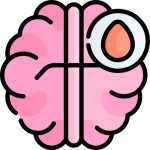Aphasia Caused by Stroke
Stroke is the most common cause of aphasia. Strokes are also known as cerebrovascular accidents (CVA). A stroke occurs when the blood supply to the brain is reduced or stopped. When this happens, the brain does not receive oxygen and nutrients, which damages the brain’s tissue.
Because the brain has many arteries that supply blood, a stroke typically only affects part of the brain. When blood flow to the brain’s language centers is stopped, aphasia can occur.
The Three Types of Stroke
Ischemic: An ischemic stroke occurs when a clot blocks blood from flowing to the brain. This is the most common type of stroke accounting for about 87% of all stroke.
Hemorrhagic: A hemorrhagic stroke occurs when a blood vessel ruptures, impacting blood flow. Also known as a brain bleed. The blood is prevented from going to the intended area, and instead builds up in the surrounding brain tissue. Aneurysms are a common cause of hemorrhagic stroke.
Transient Ischemic Attack (TIA): A TIA occurs when there is a temporary blockage of blood to the brain. It usually does not cause any permanent damage. However, having a TIA is a risk factor for having a stroke in the future. A TIA is sometimes called a mini-stroke.
The Incidence of Stroke and Aphasia
Strokes are very common. According to the Centers for Disease Control and Prevention (CDC), over 795,000 people have strokes every year. Due to better medical treatments, more people are surviving strokes. However, stroke survivors are likely to have physical disabilities and communication impairments. Stroke is the leading cause of long-term disability in the United States.
Approximately one-third of people who have a stroke will experience aphasia. Aphasia is specifically caused by a stroke that damages the brain’s language centers. These include Broca’s area and Wernicke’s area. Broca’s area is responsible for language production, while Wernicke’s area is responsible for language comprehension. Both areas are typically found in the left hemisphere of the brain, though they can be on the right side for a small percentage of people.
Aphasia following a stroke is usually at its most severe right after the stroke. Aphasia tends to get less severe (spontaneous recovery) in the days, weeks and months following a stroke. Working with a speech-language pathologist (SLP) as soon as possible can help boost recovery. SLPs can provide therapy that helps the brain recover and rewire itself.
Click on the tiles below to learn more about the most common causes of aphasia.
Stroke
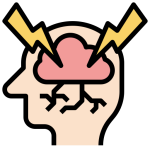
Brain Injury
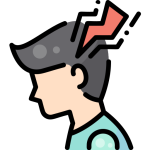
Brain Tumor
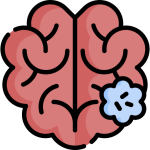
Brain Surgery
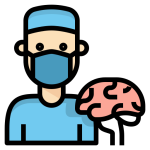
Brain Infection
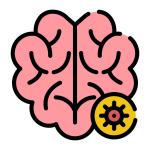
Dementia
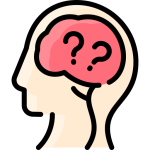
Developmental Disabilities
